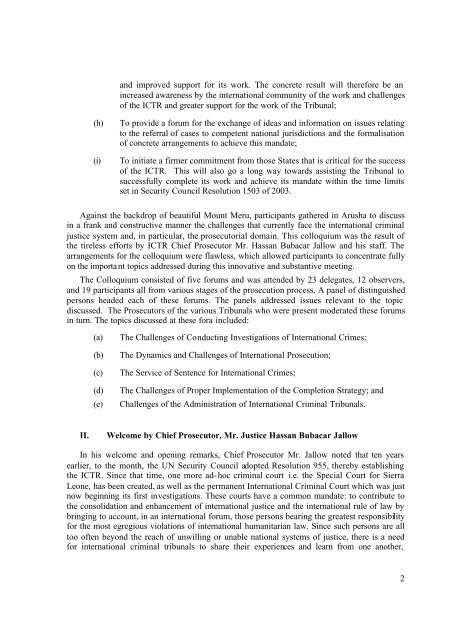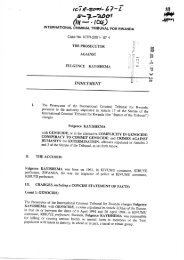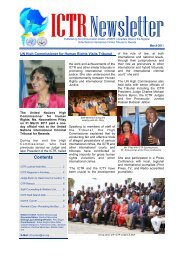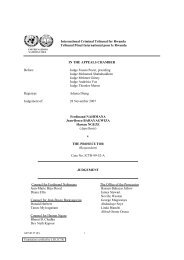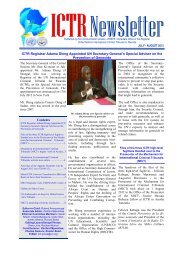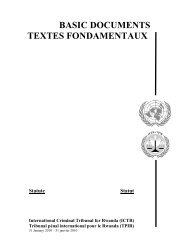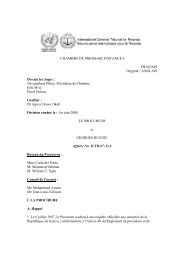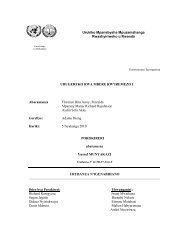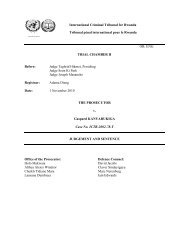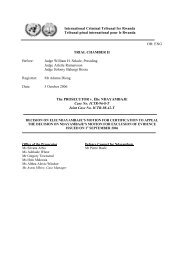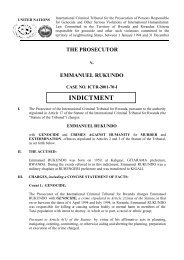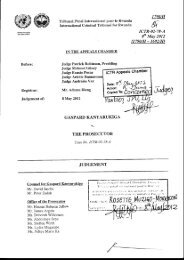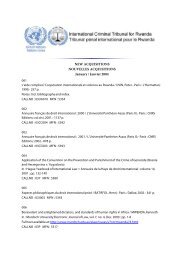Report of Proceedings - International Criminal Tribunal for Rwanda
Report of Proceedings - International Criminal Tribunal for Rwanda
Report of Proceedings - International Criminal Tribunal for Rwanda
Create successful ePaper yourself
Turn your PDF publications into a flip-book with our unique Google optimized e-Paper software.
and improved support <strong>for</strong> its work. The concrete result will there<strong>for</strong>e be an<br />
increased awareness by the international community <strong>of</strong> the work and challenges<br />
<strong>of</strong> the ICTR and greater support <strong>for</strong> the work <strong>of</strong> the <strong>Tribunal</strong>;<br />
(h)<br />
(i)<br />
To provide a <strong>for</strong>um <strong>for</strong> the exchange <strong>of</strong> ideas and in<strong>for</strong>mation on issues relating<br />
to the referral <strong>of</strong> cases to competent national jurisdictions and the <strong>for</strong>malisation<br />
<strong>of</strong> concrete arrangements to achieve this mandate;<br />
To initiate a firmer commitment from those States that is critical <strong>for</strong> the success<br />
<strong>of</strong> the ICTR. This will also go a long way towards assisting the <strong>Tribunal</strong> to<br />
successfully complete its work and achieve its mandate within the time limits<br />
set in Security Council Resolution 1503 <strong>of</strong> 2003.<br />
Against the backdrop <strong>of</strong> beautiful Mount Meru, participants gathered in Arusha to discuss<br />
in a frank and constructive manner the challenges that currently face the international criminal<br />
justice system and, in particular, the prosecutorial domain. This colloquium was the result <strong>of</strong><br />
the tireless ef<strong>for</strong>ts by ICTR Chief Prosecutor Mr. Hassan Bubacar Jallow and his staff. The<br />
arrangements <strong>for</strong> the colloquium were flawless, which allowed participants to concentrate fully<br />
on the important topics addressed during this innovative and substantive meeting.<br />
The Colloquium consisted <strong>of</strong> five <strong>for</strong>ums and was attended by 23 delegates, 12 observers,<br />
and 19 participants all from various stages <strong>of</strong> the prosecution process. A panel <strong>of</strong> distinguished<br />
persons headed each <strong>of</strong> these <strong>for</strong>ums. The panels addressed issues relevant to the topic<br />
discussed. The Prosecutors <strong>of</strong> the various <strong>Tribunal</strong>s who were present moderated these <strong>for</strong>ums<br />
in turn. The topics discussed at these <strong>for</strong>a included:<br />
(a)<br />
(b)<br />
(c)<br />
(d)<br />
(e)<br />
The Challenges <strong>of</strong> Conducting Investigations <strong>of</strong> <strong>International</strong> Crimes;<br />
The Dynamics and Challenges <strong>of</strong> <strong>International</strong> Prosecution;<br />
The Service <strong>of</strong> Sentence <strong>for</strong> <strong>International</strong> Crimes;<br />
The Challenges <strong>of</strong> Proper Implementation <strong>of</strong> the Completion Strategy; and<br />
Challenges <strong>of</strong> the Administration <strong>of</strong> <strong>International</strong> <strong>Criminal</strong> <strong>Tribunal</strong>s.<br />
II.<br />
Welcome by Chief Prosecutor, Mr. Justice Hassan Bubacar Jallow<br />
In his welcome and opening remarks, Chief Prosecutor Mr. Jallow noted that ten years<br />
earlier, to the month, the UN Security Council adopted Resolution 955, thereby establishing<br />
the ICTR. Since that time, one more ad-hoc criminal court i.e. the Special Court <strong>for</strong> Sierra<br />
Leone, has been created, as well as the permanent <strong>International</strong> <strong>Criminal</strong> Court which was just<br />
now beginning its first investigations. These courts have a common mandate: to contribute to<br />
the consolidation and enhancement <strong>of</strong> international justice and the international rule <strong>of</strong> law by<br />
bringing to account, in an international <strong>for</strong>um, those persons bearing the greatest responsibility<br />
<strong>for</strong> the most egregious violations <strong>of</strong> international humanitarian law. Since such persons are all<br />
too <strong>of</strong>ten beyond the reach <strong>of</strong> unwilling or unable national systems <strong>of</strong> justice, there is a need<br />
<strong>for</strong> international criminal tribunals to share their experiences and learn from one another,<br />
2


